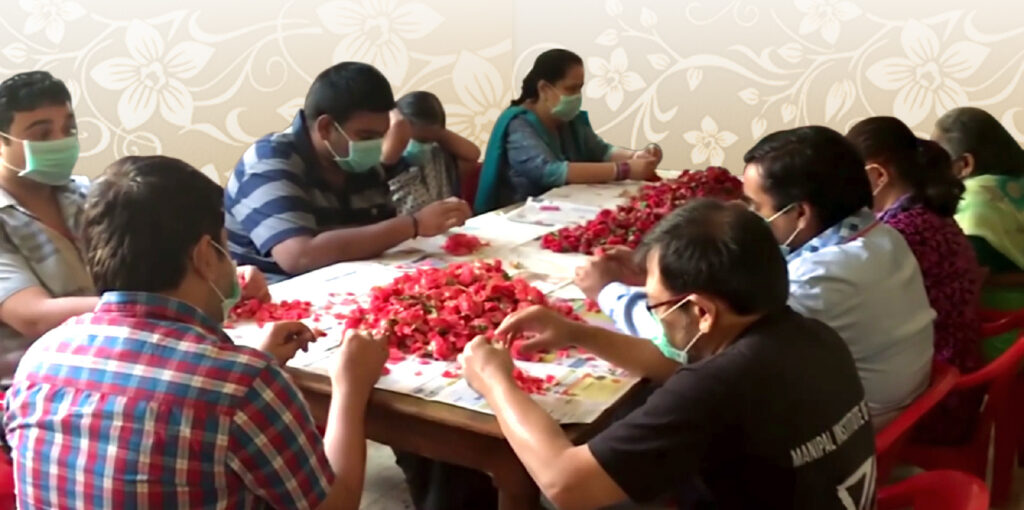Ever wondered if flowers have a power to calm the mentally-ill? The patients at the Richmond Fellowship Society in Bengaluru have proved that it certainly does.

This Holi, Bengaluru is all set for an organic riot of colours, thanks to the patients of the Richmond Fellowship Society, a 32-year-old NGO that cares for people with severe mental illness, who have made 300 kg of colour powder with flower petals this year. Beyond that, what is more significant is that this ‘Green Skill Project’ has brought a vast transformation in the patients. You may call it the Flower Therapy. And from the environment point of view, the project promotes waste recycling too.
Three years ago, Craftizen, an organisation that provides craft skill training and livelihood for unemployed, floated an idea to Dr S Kalyanasundaram, a psychiatrist, to train patients in making colour powders from flowers. “I agreed to try this exercise more as a therapy for the patients and told them that our interest is only to train patients and not in large-scale production,” says Dr Kalyanasundaram, who heads the centre.

Discarded flowers, collected from temples, festivals and marriage halls, got a new avatar with this endeavour. A team from the centre goes around and collects used flowers from various spots. The inmates were taught to de-petal the flowers, group them according to the colours. Each flower gives a different colour: roses for the red, pink, white and yellow; chrysanthemums for yellow, white and lavender; tulsi for green and marigolds for yellow and orange. “The colours we get after powdering dried petals are similar to the original colour of the flowers, maybe a shade lighter,” explains the doctor.
The petals are dried in the shade, “not in sunlight as they will lose colour,” and are powdered separately in a pulverizer. Additives are added to retain colour, and then they are packaged for sale.
The activity has been a huge success with these patients suffering from chronic mental illness such as bipolar disorder, schizophrenia, obsessive compulsive disorder, autism and intellectual disabilities. Dr Kalyanasundaram gives the example of a woman who suffered from schizophrenia and was prone to screaming at people for no reason. “For months, she was aloof, watching from the sidelines as others de-petalled the flowers at the vocational training hall. Suddenly, one day she came forward and said, “Nanu bartini,” (I too will join.) She has been with this project for over a year now and her family says that she is much calmer.” Flower power had a similar effect on the rest of the patients too.

This skilling-therapeutic project has won Dr Kalyanasundaram many accolades — including a British Medical Journal award last year. With 47 years of experience in psychiatry and treating mental illness, he has been with the centre for 30 years now on an honorary basis. “The satisfaction that I derive working here cannot be measured,” he says.
Last Diwali, the team made Rangoli powder with the same concept. The flower show organised at the Lal Bagh on the sidelines of Independence and Republic days are popular in the metro and the authorities give a huge number of dried flowers to the centre. “Last year they gave us 100 kg of fantastic red roses,” smiles the doctor.
The activity has caught on well with the patients so much so the centre is planning to give cash incentives to them post Holi and Diwali for their participation. “It will be a morale booster and will help them feel proud to say that they have earned it,” he says.
Apart from flower powder, the centre offers various other vocational activities such as making greeting cards, paper cups, paper bags and tailoring to engage patients. The tamboolam bags and cloth bags made out of used saris sell like hot cakes, says the doctor.
The Society, founded by Elly Jansen in Richmond, the UK in 1959, is a worldwide organisation with its presence in 30 countries and has three centres running under it — a day care, a short stay and a long stay home.






